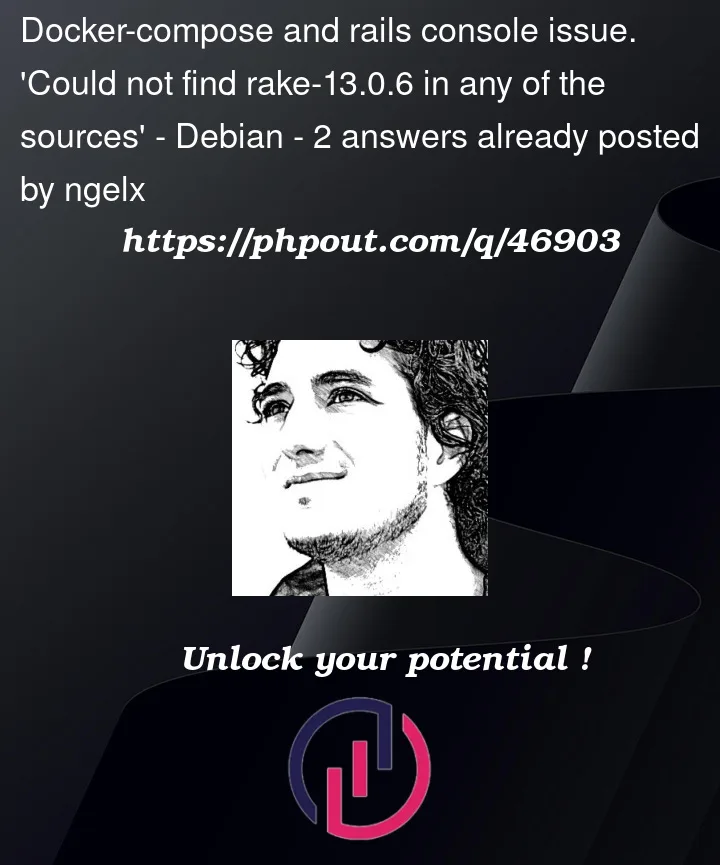I’m having some issues when trying to run rails console under docker. All other rails commands work as expected, but console does not.
➜ octopus git:(master) ✗ docker-compose run web bundle exec rails c
Creating octopus_web_run ... done
Could not find rake-13.0.6 in any of the sources
Run `bundle install` to install missing gems.
ERROR: 1
rake is installed.
➜ octopus git:(master) ✗ docker-compose run web bundle install
Creating octopus_web_run ... done
Using rake 13.0.6
Using concurrent-ruby 1.1.9
Using i18n 1.8.11
....
Bundle complete! 42 Gemfile dependencies, 144 gems now installed.
Bundled gems are installed into `./.bundle`
More over
➜ octopus git:(master) ✗ docker-compose run web bundle config list
Creating octopus_web_run ... done
Settings are listed in order of priority. The top value will be used.
app_config
Set via BUNDLE_APP_CONFIG: "/myapp/.bundle"
silence_root_warning
Set via BUNDLE_SILENCE_ROOT_WARNING: true
path
Set via BUNDLE_PATH: "/myapp/.bundle"
bin
Set via BUNDLE_BIN: "/bin"
➜ octopus git:(master) ✗ docker-compose run web bundle exec rails s -p 3000 -b '0.0.0.0'
Creating octopus_web_run ... done
=> Booting Puma
=> Rails 6.1.4.4 application starting in development
=> Run `bin/rails server --help` for more startup options
Puma starting in single mode...
* Puma version: 5.5.2 (ruby 2.7.5-p203) ("Zawgyi")
* Min threads: 5
* Max threads: 5
* Environment: development
* PID: 1
* Listening on http://0.0.0.0:3000
Use Ctrl-C to stop
^C- Gracefully stopping, waiting for requests to finish
=== puma shutdown: 2022-01-17 19:28:14 +0000 ===
- Goodbye!
Exiting
And also docker-compose up work as usual.
I’ve worked with many similar docker setup without any issue. I’m running out of ideas.
Environment setup
- gems are under ./bundle
- docker-compose version 1.29.2
- ruby 2.7
- rails 6.1.4.4
Dockerfile
FROM ruby:2.7
RUN curl -fsSL https://deb.nodesource.com/setup_17.x | bash -
# Install yarn, for webpack
RUN curl -sS https://dl.yarnpkg.com/debian/pubkey.gpg | apt-key add -
RUN echo "deb https://dl.yarnpkg.com/debian/ stable main" | tee /etc/apt/sources.list.d/yarn.list
RUN apt-get update -qq && apt-get install -y build-essential libpq-dev nodejs yarn
RUN mkdir /myapp
WORKDIR /myapp
COPY Gemfile /myapp/Gemfile
COPY Gemfile.lock /myapp/Gemfile.lock
ENV GEM_HOME /myapp/.bundle
ENV BUNDLE_PATH=$GEM_HOME
BUNDLE_APP_CONFIG=$BUNDLE_PATH
BUNDLE_BIN=$BUNDLE_PATH/bin
ENV PATH /app/bin:$BUNDLE_BIN:$PATH
ENV NODE_OPTIONS=--openssl-legacy-provider
Docker-compose.yml
version: '3.9'
services:
db:
image: postgres:13
volumes:
- octopus-db-sync:/var/lib/postgresql/data:nocopy
environment:
POSTGRES_PASSWORD: password
redis:
image: redis
web:
build: .
command: ./start_docker_development.sh
volumes:
- octopus-sync:/myapp:nocopy
environment:
BUNDLE_APP_CONFIG: /myapp/.bundle
ports:
- "3000:3000"
depends_on:
- db
- redis
- mailcatcher
nginx:
image: nginx
volumes:
- ./nginx-develop.conf:/etc/nginx/conf.d/default.conf:z
- octopus-sync:/myapp:nocopy
ports:
- "80:80"
expose:
- "80"
depends_on:
- web
mailcatcher:
image: sj26/mailcatcher
ports:
- "1080:1080"
volumes:
octopus-sync:
external: true
octopus-db-sync:
external: true
start_docker_development.sh
#!/bin/bash
bundle check || bundle install
rm -f tmp/pids/server.pid
echo > log/development.log
echo > log/test.log
bundle exec rails s -p 3000 -b '0.0.0.0'
Any help is much appreciate.




2
Answers
I've found that the issue was introduced in spring 4.0 (issue 669). Bundle env variable are ignored.
Downgrading to spring 3.1.1 fix the issue.
Gemfile
Every time you execute
docker-compose runyou create a new container, so the gems previously installed are not available anymore.In order to solve your problem you could run
bundle installin Dockerfile, install the gems in the app folderbundle install --path vendor/bundleor mount the directory bundle uses by default to store the gems, typically/usr/local/bundle